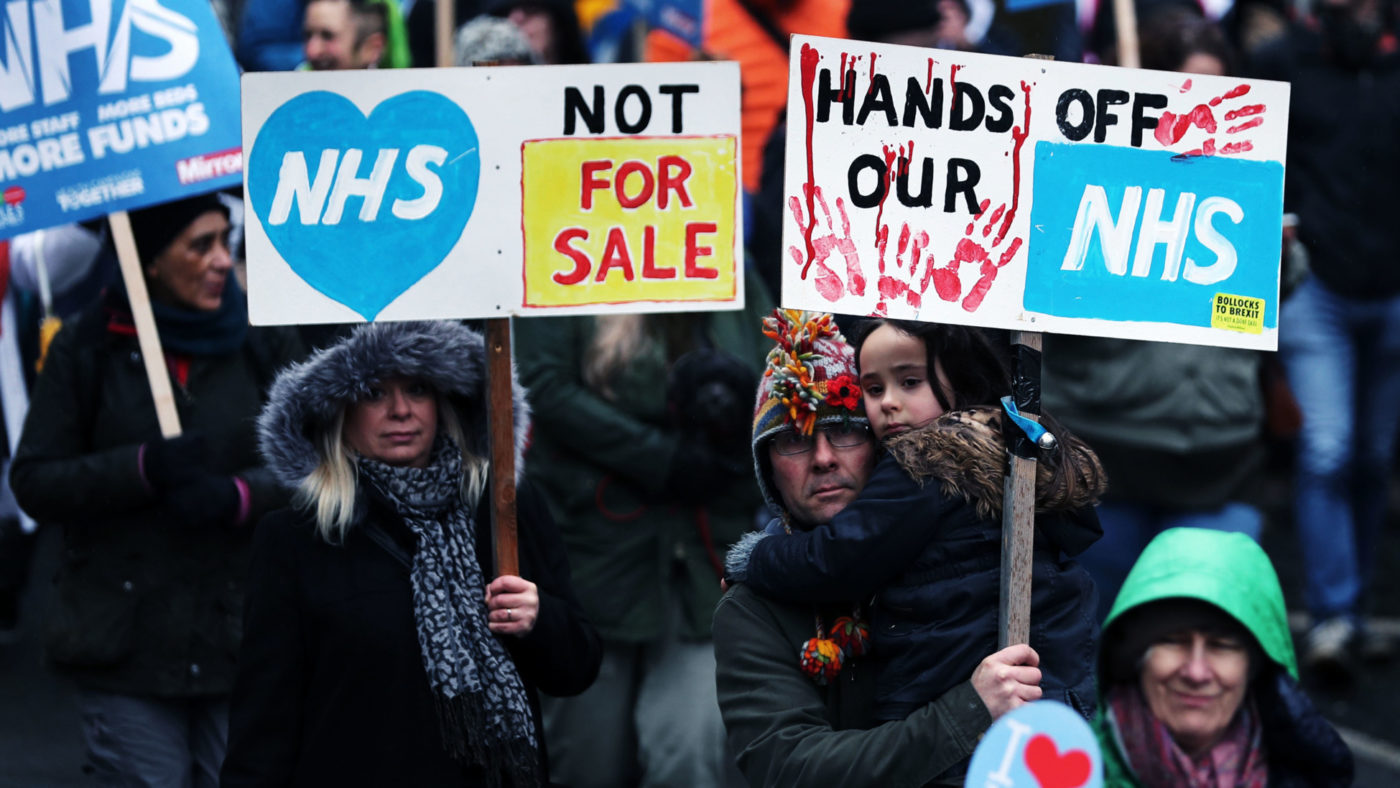President Trump’s visit has been the excuse for another burst of scaremongering about what a US-UK trade deal might mean for the NHS. You might expect dire warnings about ‘profits before people’ or ‘the Americanisation of healthcare’ to come from the far left and from die-hard Remainers. But even candidates for the Tory leadership have felt obliged to declare that “our NHS is not for sale”.
We have, of course, been here many times before. It’s almost impossible to have a sensible discussion about the NHS now that it has been raised to the same status in the UK as ‘motherhood and apple pie’ in the US. Hence the predictable howls of outrage when US ambassador Woody Johnson said that he expected the ‘entire economy’ to be on the table in negotiations over a future trade deal, including healthcare.
As it happens, the ambassador’s position was nothing new. The US has traditionally favoured a relatively liberal ‘negative list’ approach to trade deals on services, where the presumption is that a sector is included unless it is specifically excluded. President Trump has since said that the NHS would be one of the exceptions. Healthcare is a large part of any advanced economy and the NHS itself is the world’s fifth largest employer (a rather revealing fact in its own right).
What’s more, it’s not obvious what people are supposed to be so worried about. Most of the horror stories over the last few days have focused on the possibility that US firms might be allowed to bid for NHS contracts. For example, Vince Cable has warned that the US “would like preferential access to public service procurements, including the NHS”.
This is so wide of the mark that it’s hard to know where to begin. For a start, US firms already work successfully with the NHS in many areas. IBM, for example, is a major provider of IT services. Are people really saying that these contracts should be cancelled, just because IBM is American? Aren’t we supposed to be in favour of lowering barriers to global trade?
What’s more, rather than granting US ‘preferential access’, any conceivable agreement with the UK would simply put them on a level playing field with existing suppliers. US drugs companies would not therefore be able to sell medicines to the NHS at a higher price than the UK currently pays. Instead, it is far more likely that increased competition and more choice would drive down prices and raise quality, as in any other sector. Healthcare is not a ‘natural monopoly’ where a single provider can put ‘profits before people’.
There also seems to be plenty of confusion about what a US-UK trade deal might mean for how the NHS is financed. At this point, someone usually brings up Nigel Farage’s old comments about moving to an ‘insurance-based system’ (presumably more private insurance) and jumps to the conclusion that a US-UK trade deal would inevitably lead to the adoption of the American healthcare model.
This is plain daft. Just look at the diversity of funding models in the EU, which goes well beyond the degree of integration and harmonisation ever likely to be included in a US-UK free trade agreement. There’s no pressure on other EU members to copy how things are done in the NHS. Most have gone their own way, with rather more successful outcomes for patients.
So, what’s left? Some have argued that ‘market access’ provisions in a US-UK free trade agreement would force the UK to end the NHS monopoly on the provision of public healthcare. But putting aside the question of whether that would be such a bad thing, it is standard practice for certain government services to be ringfenced from these provisions. Indeed, this was a key feature of the stalled negotiations between the US and the EU over the Transatlantic Trade and Investment Partnership (TTIP).
Finally, there are concerns that a US-UK trade deal would include an investor-state dispute settlement (ISDS), or investment court system (ICS), which might allow US firms to sue the UK government for discriminatory practices and make it harder to bring services back under full public control without paying appropriate compensation.
This constraint would not necessarily be a bad thing either, but let’s put that to one side too. The more important point here is that the TTIP negotiations also provide a template for ringfencing public healthcare from an ISDS. What’s more, it’s not certain that a US-UK deal would even include an ISDS. For example, there wasn’t one in the draft of An “Ideal” US-UK Free Trade Agreement worked up by a group of free-market think tanks in 2018.
In short, the idea that a US-UK trade deal would mark ‘the end of the NHS’ is classic Project Fear. Free trade and more competition should be good for consumers – including those reliant on the NHS for healthcare. If we can trust an American company to run a critical IT system, a routine hip replacement should be a doddle.
I’m more optimistic too than others, such as Sam Lowe of the Centre for European Reform, who argue that the UK will inevitably have to bow to every US demand in order to get any agreement over the line. If the US did indeed insist on playing hardball, it would surely be time to breathe some life back into ‘no deal is better than a bad deal’.
CapX depends on the generosity of its readers. If you value what we do, please consider making a donation.


